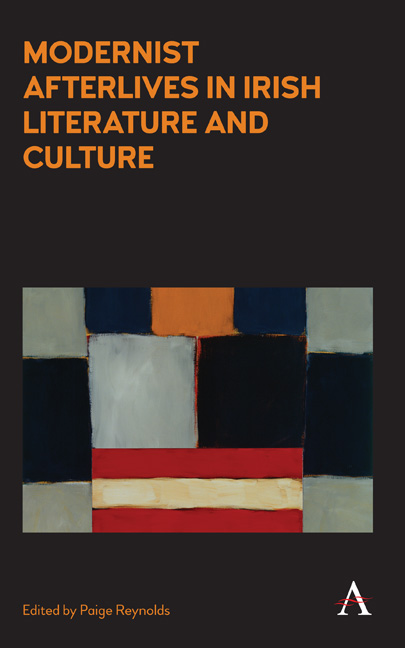Book contents
- Frontmatter
- Contents
- List of Figures
- Acknowledgements
- Introduction
- Section One LITERATURE AND LANGUAGE
- Chapter 1 ‘A World of Hotels and Gaols’: Women Novelists and the Spaces of Irish Modernism, 1930–32
- Chapter 2 ‘I Knew What It Meant / Not to Be at All’: Death and the (Modernist) Afterlife in the Work of Irish Women Poets of the 1940s
- Chapter 3 ‘Whatever Is Given / Can Always Be Reimagined’: Seamus Heaney's Indefinite Modernism
- Chapter 4 James Joyce and the Lives of Edna O'Brien
- Chapter 5 Modernist Topoi and Late Modernist Praxis in Recent Irish Poetry (with Special Reference to the Work of David Lloyd)
- Chapter 6 ‘Amach Leis!’ (Out with It!): Modernist Inheritances in Micheál Ó Conghaile's ‘Athair’ (‘Father’)
- Section Two INSTITUTIONS, ART AND PERFORMANCE
- Afterword: The Poetics of Perpetuation
- Notes on Contributors
- Index
Chapter 6 - ‘Amach Leis!’ (Out with It!): Modernist Inheritances in Micheál Ó Conghaile's ‘Athair’ (‘Father’)
from Section One - LITERATURE AND LANGUAGE
Published online by Cambridge University Press: 22 July 2017
- Frontmatter
- Contents
- List of Figures
- Acknowledgements
- Introduction
- Section One LITERATURE AND LANGUAGE
- Chapter 1 ‘A World of Hotels and Gaols’: Women Novelists and the Spaces of Irish Modernism, 1930–32
- Chapter 2 ‘I Knew What It Meant / Not to Be at All’: Death and the (Modernist) Afterlife in the Work of Irish Women Poets of the 1940s
- Chapter 3 ‘Whatever Is Given / Can Always Be Reimagined’: Seamus Heaney's Indefinite Modernism
- Chapter 4 James Joyce and the Lives of Edna O'Brien
- Chapter 5 Modernist Topoi and Late Modernist Praxis in Recent Irish Poetry (with Special Reference to the Work of David Lloyd)
- Chapter 6 ‘Amach Leis!’ (Out with It!): Modernist Inheritances in Micheál Ó Conghaile's ‘Athair’ (‘Father’)
- Section Two INSTITUTIONS, ART AND PERFORMANCE
- Afterword: The Poetics of Perpetuation
- Notes on Contributors
- Index
Summary
Since its popularization after World War I, the term modernism has come to have both a broad and an enduring application within Anglophone as well as European cultural analysis. Until recently, it was far less commonly employed in discussions of Irish-language (Gaelic) literature and culture, however. Signifying ‘the tendency of experimental literature of the early twentieth century to break away from traditional verse forms, narrative techniques, and generic conventions in order to seek new methods of representation appropriate to life in an urban, industrial, mass-oriented age’, modernism – like its generative cognate, modernity – was more often seen as something reacted to than enacted in Irish, with its enduring associations with rural life, tradition and cultural revival. Yet, as recent interventions have underscored, not only did prose writers of the Gaelic Revival share, or anticipate, key preoccupations of modernism, they also prompted late-modernist, counter-Revival challenges. A key aspect of the afterlife of Irish(-language) modernism inheres in an ongoing revision of terms set at the turn of the twentieth century (as this chapter explores), concluding with a discussion of a compelling coming-out story – ‘Athair’ (‘Father’), winner of the 1997 Hennessy Literary Award, by prominent contemporary writer, publisher and member of Aosdána, Micheál Ó Conghaile (b. 1962).
Not only forcibly and recently confronted by the ruptures of modernity – including mass political movements, rapid economic and demographic change, and what Kevin Whelan has called ‘the hollowing-out of indigenous Irish culture’ after the Great Hunger – Irish writers, like other modernist pathbreakers, were also positioned at a remove from the English literary inheritance, energized by a persistent oral tradition, motivated by cultural nationalism to challenge literary and social conventions and, perhaps, inspired by having less to lose. Accordingly, a broad swathe of mostly Anglo- Irish, Protestant Irish writers partook enthusiastically of this modernist ‘culture of experiment’ with its literary qualities of interiority, perspectivalism, radical juxtapositions, elevation of style and form, parody, self-conscious artistry and allusiveness, as well as its broader queering of social and sexual mores. Indeed, some of modernism's most famous figures are Irish writers in English, such as James Joyce (1882– 1941) and Samuel Beckett (1906– 1989), each of whom radically departed – though in sharply different ways – from the stylistic, philosophical and ideological norms that preceded him.
- Type
- Chapter
- Information
- Modernist Afterlives in Irish Literature and Culture , pp. 75 - 90Publisher: Anthem PressPrint publication year: 2016



